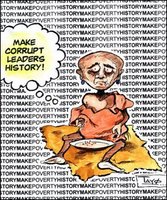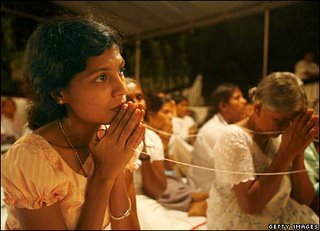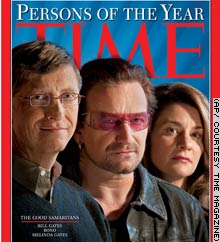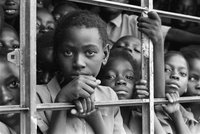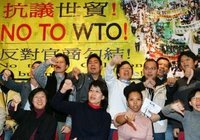Women migrant domestic workers in Singapore suffer grave abuses including physical and sexual violence, food deprivation, and confinement in the workplace.
At least 147 migrant domestic workers have died from workplace
accidents or suicide since 1999, most by jumping or falling from
residential buildings. Migrant domestic workers earn half the wages of
Singaporean workers in similar occupations, such as cleaners or
gardeners. Unpaid wages is a growing complaint.
"Many domestic workers labor without pay for months to settle debts
to employment agencies, work long hours seven days a week, or are
confined to their workplace," said Kenneth Roth, executive director of
Human Rights Watch. "Singapore’s refusal to extend ordinary labor
protections to domestic workers is leaving them open to abuse."
The 124-page report, "Maid to Order: Ending Abuses against Migrant
Domestic Workers in Singapore," is based on more than one hundred
in-depth interviews with domestic workers, government officials, and
employment agents. It details a range of abuses endured by domestic
workers in Singapore and the response of the Singaporean
government.
Families in Singapore employ approximately 150,000 women,
primarily from Indonesia, the Philippines, and Sri Lanka, as domestic
workers. Human Rights Watch said the Singaporean government has
instituted some encouraging reforms in the past two years. These
include creating mandatory orientation programs for employers and
domestic workers, prosecuting cases of unpaid wages and physical
abuse, and introducing an accreditation program for employment
agencies.
But key labor conditions, such as wages, hours of work, and salary
deductions are left to employers and agencies, while domestic workers
have little or no bargaining power. Human Rights Watch said that
authorities have excluded domestic workers from the country's main
labor laws. Starting in January, domestic workers signing new
contracts will be entitled to a single day off a month.
But key labor conditions, such as wages, hours of work, and salary
deductions are left to employers and agencies, while domestic workers
have little or no bargaining power. Human Rights Watch said that
authorities have excluded domestic workers from the country's main
labor laws. Starting in January, domestic workers signing new
contracts will be entitled to a single day off a month.
"One day off a month is a poor solution," said Roth. "Domestic
workers deserve a weekly rest day and protection under Singapore’s
Employment Act like other workers."
Singapore imposes a monthly levy on employers of migrant domestic
workers to regulate demand. Employers pay S$200-295 [U.S.$118-
174] to a central government fund each month, more than the wages of
many domestic workers themselves. None of these funds, roughly
S$360-531 million (U.S.$212-313 million), are earmarked for services
geared toward migrant domestic workers.
Intense competition among the more than six hundred employment
agencies has led them to shift the cost of recruitment, transportation,
training, and placement from employers to domestic workers. To pay
for these charges, many domestic workers labor for 4-10 months with
little or no pay. Some employment agencies fail to provide assistance
in cases of employer abuse, sink domestic workers deeper into debt by
overcharging those who transfer employers, and confiscate religious
items such as prayer garments and holy books.
To control illegal immigration, the Singapore government imposes a
security bond on each employer, who forfeits S$5,000 [U.S.$2,950] if
their domestic worker runs away. Immigration regulations prohibit
domestic workers from becoming pregnant. Human Rights Watch said
that these policies become incentives for employers to tightly restrict
domestic workers' movements to prevent them from running away or
having boyfriends. For example, some employers prevent domestic
workers from having weekly rest days, forbid them from talking to
neighbors, and sometimes lock them in the workplace. Heavy debts
and confinement at home mean that some domestic workers cannot
escape serious workplace abuses.
"I was not allowed to go outside. I never went outside, not even to
dump the garbage…," said Sri Mulyani (not her real name), a domestic
worker interviewed by Human Rights Watch. "I felt like I was in jail.
It was truly imprisonment…. I could only see the outside world when I
hung clothes to dry."
Roth said, "In the same way that the government has pursued
employers who beat their domestic workers, officials must tackle
agencies that charge workers ten months of their salaries and
employers who confine domestic workers to the workplace."
Given their isolation in private homes, it is difficult to ascertain the
exact proportion of migrant domestic workers who face abuse. The
Indonesian embassy estimates that it receives fifty complaints per day,
mostly from domestic workers. The Philippines embassy and the Sri
Lanka High Commission estimate receiving forty to eighty complaints
from domestic workers per month. Human Rights Watch said that
many abuses are likely never reported, especially if an employer
repatriates a domestic worker before she has a chance to seek help.
Singapore's laws and regulations offer stronger protection than do
those of neighboring countries such as Malaysia. Singapore is still far
behind Hong Kong, which includes domestic workers in its main labor
laws, protecting their rights to a weekly rest day, a minimum wage,
maternity leave, public holidays, and paid annual leave.
Human Rights Watch urged the Singapore government to provide
comprehensive protections to migrant domestic workers by amending
the Employment Act and regulating charges imposed by agencies so
that migrant domestic workers do not spend 4-10 months working off
their debts. Singapore should consider adjusting the monthly levy to
offset the cost to employers.
"In a country well-known for strictly enforcing laws to promote order
and efficiency, the failure to provide adequate and equal protection to
an entire class of workers is an anomaly," said Roth. "By
implementing comprehensive reforms, Singapore could become a
standard-setter in the region for migrant domestic workers."
 While most people today are thrilled (or not so thrilled) about the gifts they received under the Christmas tree this year, a group of young girls in Tanzania are fortunate this year to be given the gift of life.
While most people today are thrilled (or not so thrilled) about the gifts they received under the Christmas tree this year, a group of young girls in Tanzania are fortunate this year to be given the gift of life. 